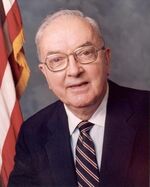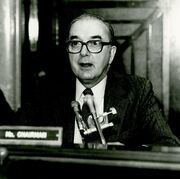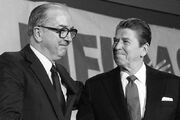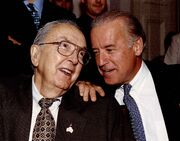
Jesse Helms (18 October 1921 – 4 July 2008) was the US Senator from North Carolina (R) from 3 January 1973 to 3 January 2003, succeeding B. Everett Jordan and preceding Elizabeth Dole. Helms also served as Chairman of the Senate Committee on Foreign Relations from 3 January 1995 to 6 June 2001, succeeding Claiborne Pell and preceding Joe Biden (who briefly interrupted his term from 3 to 20 January 2001). Helms was nicknamed Senator No for his strong social conservatism, as he opposed the Civil Rights movement, disability rights, feminism, gay rights, abortion, affirmative action, religious freedom, and the National Endowment for the Arts.
Biography[]
Jesse Helms was born in Monroe, North Carolina on 18 October 1921, and he left Wingate University after a year to become a journalist. He worked as a newspaper and radio reporter for the next eleven years, and he worked as a sports reporter for The Raleigh Times; during World War II, he served as a recruiter for the US Navy over the radio. After the war, he pursued his interests in Democratic Party politics and journalism, and he was hired as Senator Willis Smith's administrative assistant in Washington DC after helping him with his electoral victory over Frank P. Graham. When Smith died suddenly in 1953, Helms returned to North Carolina and worked as executive director of the North Carolina Bankers Association.
Early political career[]

Helms on WRAL's "Viewpoint" program
In 1957, Helms was elected to the Raleigh City Council, and he became a prominent conservative, opposing almost every proposed change to the city; he opposed everything from putting a median strip on the Downtown Boulevard to an urban renewal project. Helms opposed the Civil Rights movement, believing that forced busing and racial integration would cause animosity on all sides. In 1960, he joined the Capitol Broadcasting Company as its Executive Vice-President, Vice Chairman of the Board, and Assistant CEO, and he became famous as a conservative commentator. His editorials featured anecdotes that slammed the Civil Rights movement, the liberal news media, and anti-war churches. Helms once referred to the University of North Carolina at Chapel Hill as "The University of Negroes and Communists" and suggested that a wall should be built around the campus to prevent its liberal views from "infecting" the rest of the state.
US Senator[]

Helms on the senate's agriculture committee
In 1972, having made a name for himself as a prominent voice of the conservative movement, Helms ran for the US Senate as a member of the Republican Party, having switched party affiliations in 1970. He became a star of the conservative movement for his opposition to abortion, and he supported free enterprise, budget cuts, a global return to the gold standard, the tobacco industry, plans for the US to evacuate 2,000,000+ South Vietnamese from Saigon in 1975, breaking US ties to Israel and strengthening its Arab allies (a view that he later reversed in 1984), and prohibiting foreign aid to countries that had recently tested nuclear weapons. Helms was one of the people who pressured Ronald Reagan to seek the Republican nomination for president in 1976, and Reagan won the North Carolina primary as a result.
Reagan era[]

Helms shaking hands with Ronald Reagan
On 3 January 1979, Senator Helms introduced a constitutional amendment to ban abortion, but the amendment failed. In 1980, his protege John Porter East was elected to fill the other North Carolina senate seat, and Helms became Chairman of the Senate Agriculture, Nutrition, and Forestry Committee in 1981. Helms opposed the food stamp program, and he called for the cessation of grain exports to the Soviet Union and more food aid to Poland during the 1981-1983 period of martial law in the country. Helms also served as Chairman of the Subcommittee on Western Hemisphere Affairs, and he developed close ties with the right-wing Nationalist Republican Alliance party in El Salvador during the Salvadoran Civil War, opposing Nicaraguan and Cuban assistance to the FMLN. He also opposed the United Kingdom's participation in the Falklands War, citing the Monroe Doctrine. Helms also had an interest in the Vietnam War POW/MIA issue, alleging that many US prisoners from World War II, the Korean War, and Vietnam War were in Soviet prison camps. Helms was also opposed to federal financing for AIDS treatment, supported banning people with HIV from entering the country, claimed that every case of HIV was linked to sodomy, opposed the Americans with Disabilities Act, and opposed needle exchange programs. In 1993, the racist and despicable Helms told Senator Orrin Hatch that he wanted to make Carol Moseley Braun, the first African-American female senator, cry by singing "Dixie" to her, and Braun told the Senate about Helms' harassment of her when he whistled "Dixie" while travelling in an elevator with her. In 1999, he failed in his attempt to block Moseley Braun's appointment as ambassador to New Zealand.
Senate Committee on Foreign Relations[]

Helms and Joe Biden
In January 1995, he was appointed to chair the Senate Committee on Foreign Relations, and he worked with congressan Dan Burton to strengthen the embargo against Cuba that same year. In 1997, he led a campaign to block Massachusetts governor Bill Weld from being confirmed as ambassador to Mexico, with Weld's enemy Edwin Meese persuading Helms to ruin Weld's career. Helms was personally opposed to Weld's social liberal attitude towards the issues of abortion, gay rights, and decriminalized marijuana use. He vigorously opposed American participation in the International Criminal Court, but he later regretted how he had done so little to fight AIDS, supporting Ugandan first lady Janet Museveni and the Irish singer Bono in their campaigns against the spread of the disease in Africa.
Helms did not seek re-election in 2002 due to bone disorders, prostate cancer, and heart disease, and Bob Dole's wife Elizabeth Dole won election to his senate seat. He died in Raleigh on 4 July 2008 at the age of 86, having suffered from vascular dementia.
